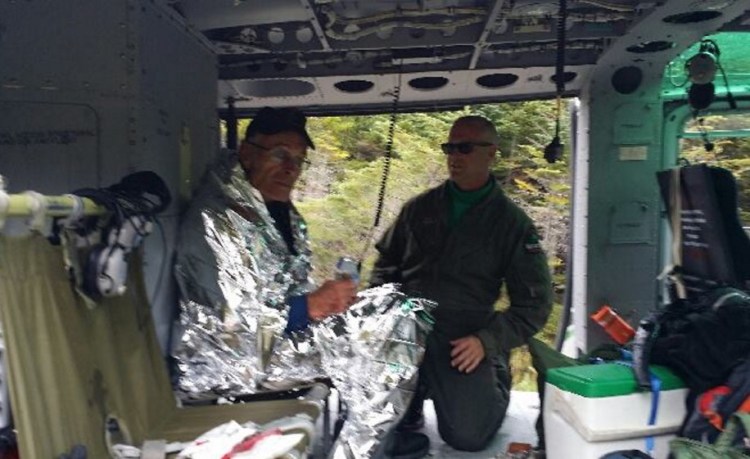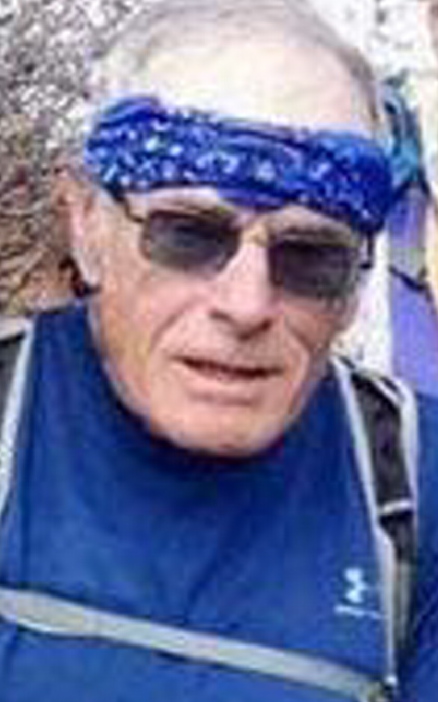As a veteran outdoorsman who has logged thousands of miles on trails, John Lyon was scratched up, bruised but still feeling confident during the first two days he was lost in the dense, mountainous forests of Baxter State Park last week.
It was on the third day alone in Baxter, however, that the “What if?” questions began creeping into the 78-year-old’s mind.
That was until he spotted another rescue helicopter circling overhead.
“I prayed right before then, and I never pray,” Lyon said with a laugh Monday. “It was getting colder.”
Lyon was recuperating with family in Millinocket Regional Hospital roughly 24 hours after he was plucked from a remote mountainside by Maine Forest Service rangers who had spotted him waving from what they described as a rock slide near Fort Mountain.
The Dumfries, Virginia, resident became separated from his hiking group Thursday afternoon and apparently survived on granola bars, water and his backwoods skills for three days.
He was being treated for a partially collapsed lung – injured in a fall during which he hit his chest – plus plenty of bumps and bruises.
“Oh yeah, tons of them,” he said. “It looks like I was in a fight with a bear or something. It was quite an experience.”
Maine Forest Ranger Ben Goodwin, who was one of two rangers who were lowered from the helicopter to meet Lyon, said he “got goose bumps” when he realized they had found the lost hiker because oftentimes the outcome is not as positive after someone is lost for three days.
“It was pretty exciting, pretty exhilarating,” Goodwin said.
Lyon is no stranger to rugged and remote trails or long hikes. Just three years ago, at age 75, he completed his “section hike” of the Appalachian Trail, an accomplishment in which individuals hike the entire, roughly 2,190-mile trail in chunks typically over years rather than in a single “thru-hike.”
And Lyon and his fellow members of the Potomac Appalachian Trail Club had hiked to the top of Mount Katahdin – an arduous hike no matter the route – in the days prior to the hike Thursday when he became separated.
In a phone interview from his hospital room, Lyon acknowledged Monday that he had made several major mistakes during this most recent hike despite all of his experience.
For instance, members of his hiking group were carrying maps as they began their hike along the OJI Trail to South Brother Mountain but he did not.
Lyon was hiking faster than the others, so he forged ahead with plans to reconnect with them later on the trail.
But Lyon missed the short side trail to South Brother Mountain and didn’t realize it until sometime later.
“That was the biggest mistake: I didn’t have a map and I had never been there before,” he said.
Lyon spent the first night bedded between two boulders and then slept in what he said was a more comfortable grassy area another night.
He had a flashlight – which he used to try to signal an earlier helicopter – but no fire-starting materials.
Luckily, the weather was mild and the evenings were chilly but not dangerously cold, Lyon said.
“I’ve been a lot colder before,” he said with a laugh.
Lyon kept his head together by thinking about his family and friends.
He spent much of his lost time bushwhacking through Baxter’s rugged, thick forests and even climbed to the top of nearly 4,000-foot-tall Fort Mountain in hopes of better orienting himself.
But he admitted his worries were rising in the hours before the Maine Forest Service helicopter spotted him.
“Those rangers are something special,” Lyon said.
All told, well over 50 people from Baxter State Park staff, the Maine Forest Service, the Maine Warden Service and other volunteer groups helped search for Lyon on Saturday and Sunday.
Cpl. John MacDonald with the Maine Warden Service said people often get into trouble when lost because they try to find their own way out.
As an alternative, MacDonald pointed to the two 14-year-old girls who were found cold but unhurt on a trail near Gulf Hagas south of Moosehead Lake in mid-August because they stopped hiking and waited for help.
Lyon’s hiking partners knew where he was last seen and where he was supposed to be headed, which enabled the groups to narrow the search area.
“Even for day-hikers, letting people know where you’re going and an expected time of arrival, it gives us a Point A to Point B, which is helpful,” MacDonald said.
Goodwin was still marveling Monday at the distance and “brutal” terrain that Lyon covered, adding that he “got beat up” just making his way to Lyon from the beaver bog where the helicopter set him down not far away.
But while Lyon was tired and weakened, the 78-year-old was in good shape and spirits considering his ordeal, Goodwin said.
Lyon said he would probably continue hiking – he tries to go twice a week – but would stick with his group and make sure he has a map.
He might give up backpacking. But as he rested in Millinocket with family, Lyon was jovial and thankful for all of the people who helped search for him Monday and for the rangers who found him.
“That was the nicest feeling,” Lyon said.
Send questions/comments to the editors.





Comments are no longer available on this story